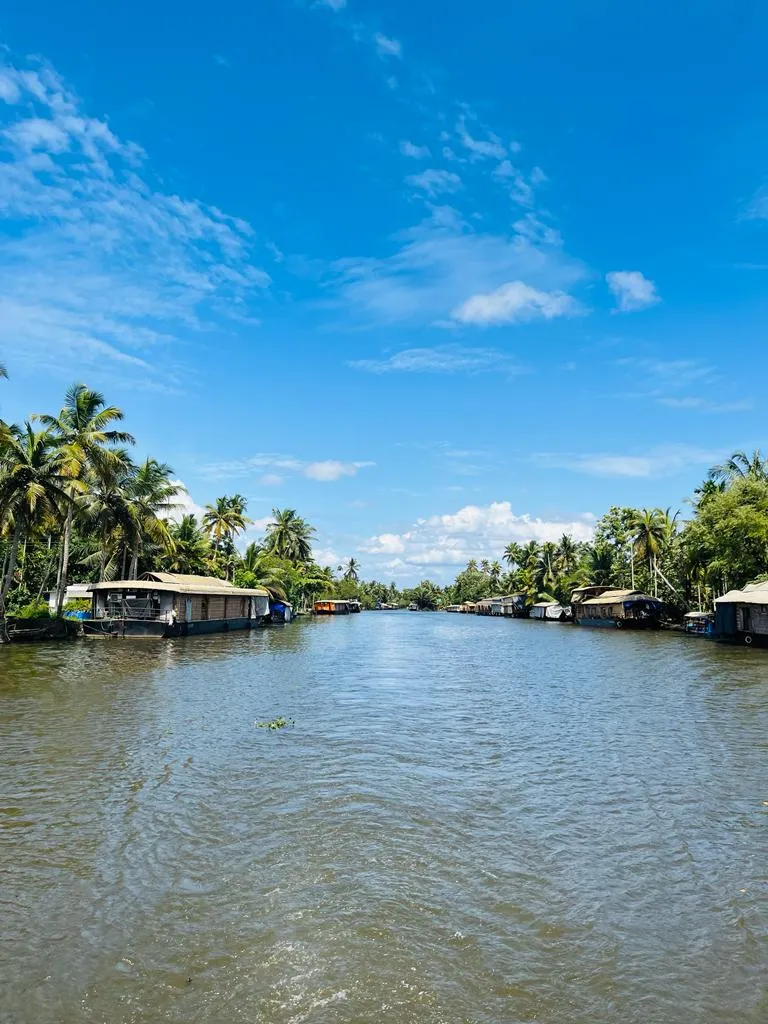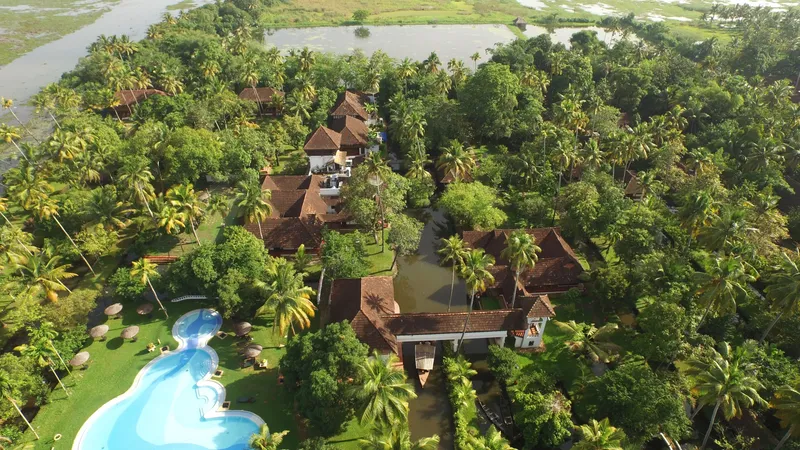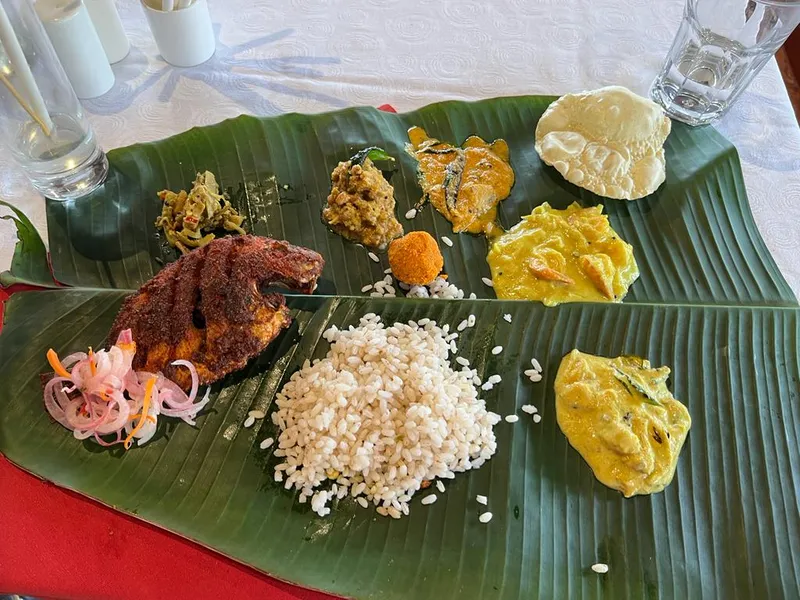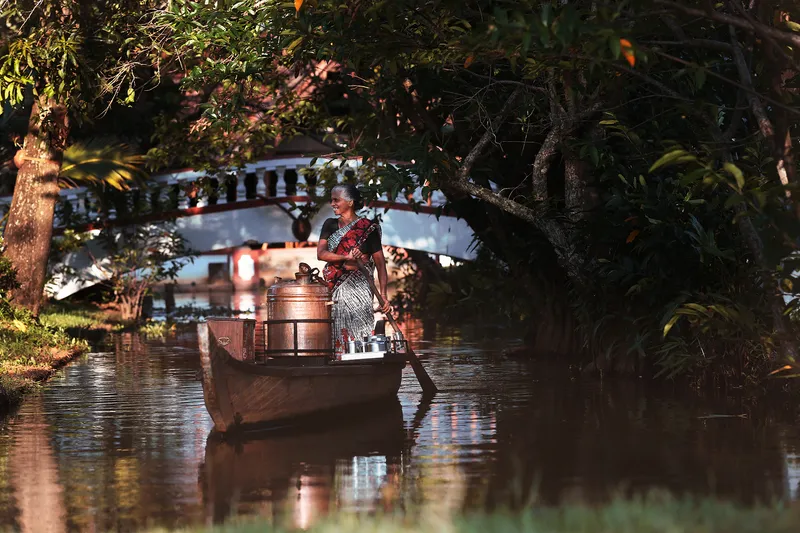Experience the Kuttanad life at Coconut Lagoon, a luxury resort in the lap of nature
No two rooms are the same at CHG Earth’s Coconut Lagoon, which was built on land reclaimed from coconut cultivation. This ecological resort in Kumarakom offers a glimpse into the culturally rich and tradition-laden Kerala way of life.
Much has been said about India and its vast cultural and geographical diversity. While the beach-or-mountain debate continues, the backwaters of Kerala have been silently stealing the show–without much rave or fuss.
With more than 7 million domestic tourists and 60,000 foreign tourists making it to Kerala in 2021, tourism has truly been flowing into God’s Own Country. And when I visited the serene backwaters of Kumarakom recently, I understood why.

The backwaters of Kumarakom | Image: Debolina Biswas
Dotted with canals, the backwaters of Kottayam district not just offer the perfect backdrop for a relaxing vacation but also attract nature lovers for its diversity of migratory birds.
It’s said that luxury lies in simplicity, but at CGH Earth’s Coconut Lagoon, luxury lies in living amidst tranquil nature, with the only sounds coming from the chirping of birds and the rowing of boats.
Opened to guests in 1993, Coconut Lagoon is nested in the cove of India’s longest lake, Vembanad, and overlooks a bird sanctuary. Here, time truly stops as one experiences the vibrant culture and life of the Kuttanad region, which covers the districts of Alappuzha, Kottayam and Pathanamthitta in the state of Kerala.
Coconut Lagoon can only be reached by a boat from the hamlet of Kavanattinkara, which is a two-hour drive from the Kochi airport. The 10-minute boat ride along the backwaters of Vembanad Lake gives travellers the opportunity to leave behind the city’s chatter and embark on a journey to understand the Kerala way of life.
Immersing in the breathtaking view, I reached the cove, listening to the faint strains of traditional musical instruments in the background.
Every guest at Coconut Lagoon is welcomed with traditional music played by a local artist, a kasavu shawl, and, of course, tender coconut water.
“Coconut Lagoon is an extension of its surrounding village. The resort has no walls–physically or metaphorically,” says Samboo Gopalakrishnan, General Manager at Coconut Lagoon.

Aerial view of CGH Earth's Coconut Lagoon
The art of revival
Reclaimed from coconut cultivation, the 28-acre Coconut Lagoon features strips of land and water within the property. About 15 acres of the land is dedicated to fish farming and coconut farming, while the rest of the property houses 27 heritage bungalows, 14 heritage mansions, and 8 lake-front villas with private pools.

Heritage mansions at the Coconut Lagoon are centuries-old tharavad–ancestral homes of Kerala’s aristocrats | Image: Debolina Biswas
The property features more than 200 trees and plants and buffalo grass lawns that form a natural carpet across the land. History informs that Kumarakom was once a mangrove forest area in Kerala. During a boat ride to the resort, one can spot traces from a time gone by.
Architecture plays an integral role in the whole experience at Coconut Lagoon, where no two rooms are alike. The wooden structures at the resort, which were rescued from demolition and refurbished later, are shrouded in ancient tales of craft, culture and creativity.

Inside a heritage mansion in Coconut Lagoon
The reception area, which also serves as a stage for cultural performances every evening, features an open-roof courtyard and is built in the nalukettu (four blocks) structure.
The heritage mansions are centuries-old tharavad–ancestral homes of Kerala’s aristocrats. Its structures are based on Thachu Shastra–ancient carpentry principles known for precision and intricate carvings.
“This style is so precise that the wooden joinery does not use nails. Unique floral and geometric wooden adornments dot the architecture, built by master craftsmen using traditional materials,” explains Gopalakrishnan.
The multi-cuisine restaurant Ettukettu is the oldest structure at Coconut Lagoon, dating back over 500 years. It used to be the ancestral house of Arya Antharjanam, wife of Kerala’s first elected CM, EMS Namboodiripad.
Preserved and transplanted from the Neendoor village of Kottayam, the restaurant gets its name from the Ettukettu style of traditional Brahmin homes made from teakwood.
Local offerings

The curry lunch at Ettuketty offers 12 delicacies borrowed from the local homes of Kerala | Image: Debolina Biswas
Restaurant Ettuketty offers a taste of Kerala homes. With authentic flavours served in fresh banana leaves, the curry lunch here is to die for.
The curated four-course meal includes 12 delicacies–consisting of rice pancakes, rice, curries, vegetables, chicken and local fish and ending with the quintessential Kerala payasam, all borrowed from local homes.
Aymanam, the specialty restaurant here, offers an array of seafood preparations–lobsters, tiger prawns, scampi, and squid. Step in for dinner to relish the local catch of the day, grilled to perfection.
One experience that truly provides a glimpse into the backwater way of life is the evening floating tea shop.
“When Kuttanad lived up to its name of the ‘rice bowl of Kerala’ and the paddy fields were bustling with workers, a chaya vallam (floating tea shop) would go around the waterways surrounding the fields, delivering a cuppa. The tea was hot, and so too perhaps was the gossip after a long day’s labour!” Gopalakrishnan quips.
The chaya vallam at Coconut Lagoon captures the very essence of that period.
The tea lady comes in on a boat and serves the evening tea right out of an old-style samovars, along with bhajjis.

Chaya vallam at Coconut Lagoon; the tea lady comes in on a boat every evening to serve hot tea and bhajjis
Never a dull day here
CGH Earth has created quite a world within Coconut Lagoon.
Given the plethora of experiences offered within the property, one may have to miss a few activities in order to make the most of the rest.
Vembanad Lake and the bird sanctuary overlooking the property offer guests a sight of some of the rarest species of birds.
During my bird walk, I spotted the brahminy kite, the black headed oriole, the Indian and little cormorant, the whistling duck, and the kingfisher. My eyes also caught an ashy prinia and a flowerpecker–the smallest bird of India.
After bird watching, I headed to the butterfly garden at Coconut Lagoon, which boasts 54 species of butterflies, dragonflies, and damselflies.
If one doesn’t prefer walking, they can opt for a canoe ride or kayaking across the tranquil backwaters of Kumarakom. One can also hire an electric bicycle to explore life across the paddy fields and villages.
Afternoons at Coconut Lagoon can be spent relaxing at the Ayurveda centres. The specialists here offer a range of treatments and rejuvenating massages.

Coconut Lagoon features more than 200 trees and plants, and buffalo grass lawns that form a natural carpet across the land
Following this, one can head to the sunset cruise–an activity that one cannot afford to miss. The hour-long boat ride across the lake is made even more mesmerising by the melodic strains of a flautist aboard.
Every evening, CGH invites local artists and musicians to demonstrate the culture of Kerala through traditional dance and music performances.
While October to March is the best time to visit the backwaters, June and July offer lush green vegetation and a picturesque setting. Although there might be some restrictions with respect to outdoor activities, the monsoons in Kumarakom have their own charm.
Average cost per night: Rs 13,000-Rs 25,000, depending on the time of booking and the accommodation type
Edited by Swetha Kannan







